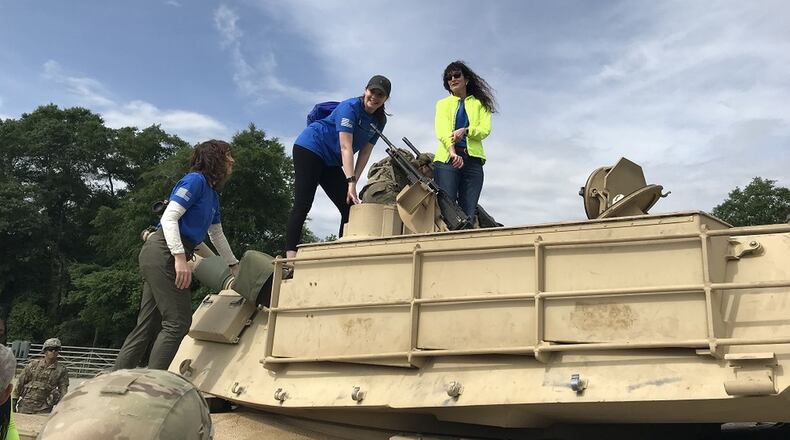Barbara Rothbaum watched an M1A2 tank test fire its .50-caliber machine gun and then its deafening main gun. Afterward, she clambered atop one of the tanks, sat inside it and then fired a pistol, a shotgun and an automatic rifle on a marksmanship range.
The psychologist leads the Emory Healthcare Veterans Program, which treats current and former troops struggling with post-traumatic stress disorder and traumatic brain injuries. Accompanied by a dozen of her colleagues, Rothbaum said her visit to Fort Benning helped her better understand what troops experience.
“When that big gun goes off on the tank, you feel it in your body,” said Rothbaum, who teaches psychiatry at Emory University. “If that was happening over and over and over 24-7 — you can just imagine that context.”
RELATED: Georgia vet says Emory program ‘changed my whole life’ after facing tragedies in Afghanistan
Started in 2015 and supported by the Wounded Warrior Project, Rothbaum’s program has served more than 1,500 people so far and is already expanding. A $2 million grant from the Wounded Warrior Project helped the program double its space in Atlanta to 10,000 square feet this year. That will eventually allow it to begin serving twice as many new people each week, up from six to 12. Meanwhile, the program is hoping to begin treating civilians through an intensive outpatient program.
As many as 20% of veterans of the wars in Iraq and Afghanistan suffer from PTSD, which can be triggered by life-threatening events, including combat, natural disasters, car wrecks and sexual assaults, according to the Veterans Affairs Department. Symptoms can include upsetting memories, nervousness and sleeplessness.
Also common among Iraq and Afghanistan war veterans, traumatic brain injuries are caused by explosions — such as those from roadside bombs — and can cause headaches, blurred vision, loss of balance, chronic depression, slowness in thinking and problems with concentration. As of September of 2013, 221,895 veterans had joined the VA’s national TBI registry.
Rothbaum and her colleagues also met with U.S. Army Rangers here Thursday. Among them was Capt. Jeremy Noble, a regimental psychologist with the 75th Ranger Regiment. Of the 1,655 rangers based at Fort Benning, he said, just three are seeking treatment for PTSD. That low number, he said, speaks to the resiliency of the troops in his regiment Still, he said he welcomes the opportunity to refer troops to Rothbaum’s program.
“They are doing treatment that is evidence-based, and that is what we want,” he said. “Now we can send guys up there when they need it.”
Noble and his fellow rangers served Rothbaum and the other visitors their combat field rations, called Meals Ready-to-Eat. Rothbaum got the “Chicken Chunks, White, Cooked” version. She gamely spread the chicken chunks on a piece of flatbread and then chomped on it. Asked how she liked it, Rothbaum sought to put it in perspective.
“Who are they for? They are for people in faraway places under hard circumstances. If you have been in a firefight — if you have just been battling for your life and you just got to safety and you are dry, safe and hungry — I can imagine it would taste delicious.”
About the Author
Keep Reading
The Latest
Featured



